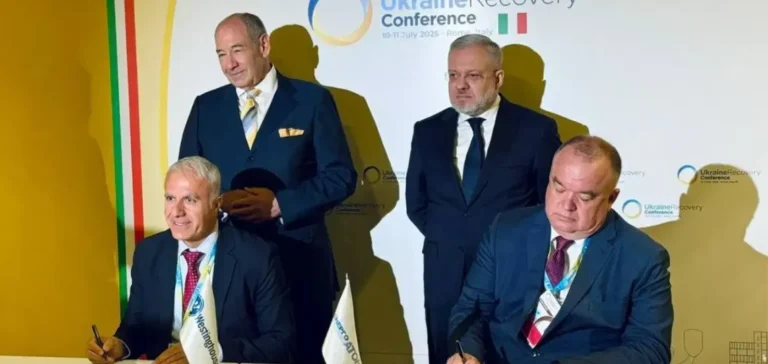Energoatom, Ukraine’s national nuclear energy company, signed two major agreements with Westinghouse Electric Company and Holtec International during the Ukraine Recovery Conference. These partnerships aim to strengthen the industrial autonomy of Ukraine’s nuclear sector by localising the production of key components and developing new technologies within the country. The Ukrainian Minister of Energy was present at the signing of the official documents.
Nuclear fuel plant with Westinghouse Electric Company
The agreement between Energoatom and Westinghouse Electric Company provides for the creation of a plant dedicated to the production of nuclear fuel assemblies in Ukraine. Westinghouse Electric Company, already engaged in the supply of nine AP1000 units for the country, is thus expanding its collaboration with Energoatom. The Ukrainian subsidiary AtomEnergoMash, recently approved as a qualified supplier by Westinghouse Electric Company for the manufacturing of components for VVER-1000 assemblies, will play a central role in this industrial project.
Energoatom’s Chief Executive Officer, Petro Koptin, highlighted the continuity of the industrial localisation strategy. The President of the Nuclear Fuel division at Westinghouse Electric Company, Tarik Choho, noted that fuel developed by the company has already been successfully used in Ukrainian VVER-1000 and VVER-440 nuclear power plants for more than twenty years.
Industrial deployment of small modular reactors
Energoatom and Holtec International have formalised a cooperation agreement to launch local production of components for small modular reactors (SMR) and containers for used nuclear fuel storage. This partnership provides for the use of Holtec International’s technology for container manufacturing, already deployed at the Centralised Spent Nuclear Fuel Storage Facility, a plant built by Holtec International using equipment sourced from the United States.
The signed memorandum includes measures for technical support and training of Ukrainian specialists within the Holtec International SMR-300 programme, in partnership with the Palisades nuclear power plant. According to Holtec International’s objectives, two SMR-300 units could begin operation at this site in the United States by 2030.
Strengthening the industrial chain and national skills
These agreements signed during the international conference mark a milestone in Energoatom’s strategy, which aims to secure the country’s nuclear supply chain while developing local industrial capacity. The Ukrainian government seeks to position Ukraine as a major regional player in the nuclear sector by relying on industrial partnerships and technology transfers.
The active participation of the Ministry of Energy in the ceremony highlights the importance of these agreements for the energy sector. The announced projects are expected to increase national industrial production and train a new generation of nuclear energy specialists.






















